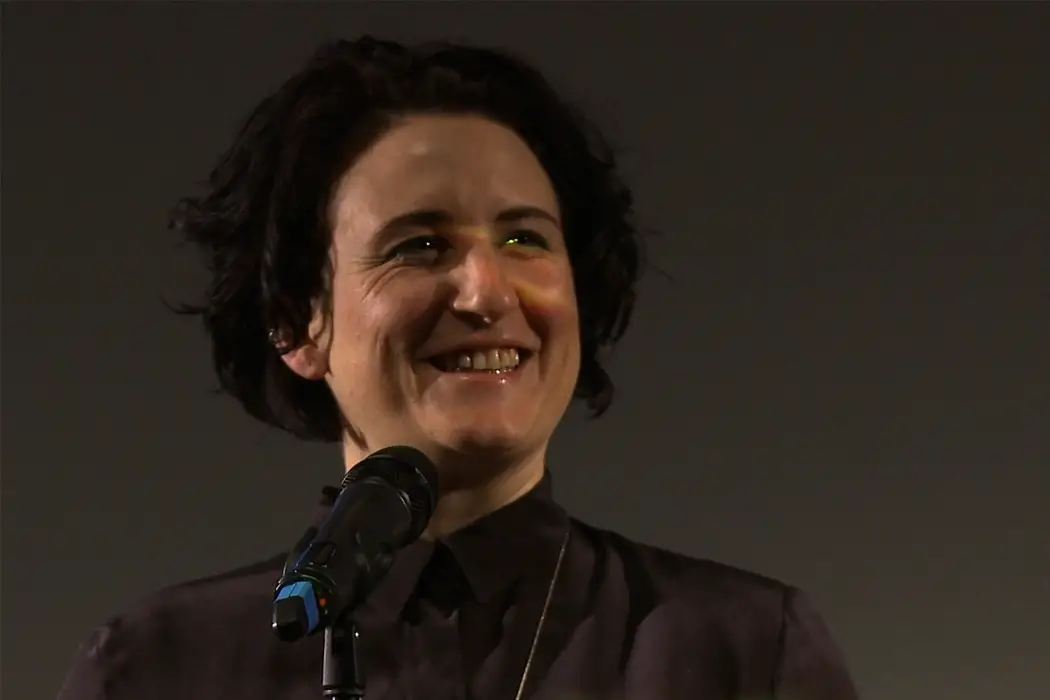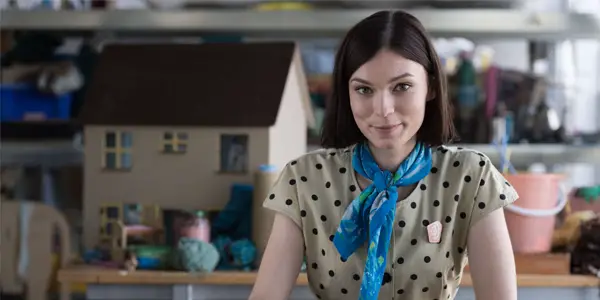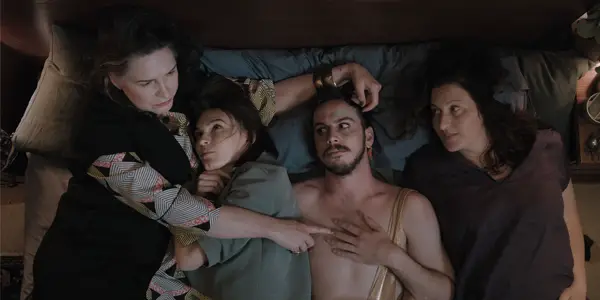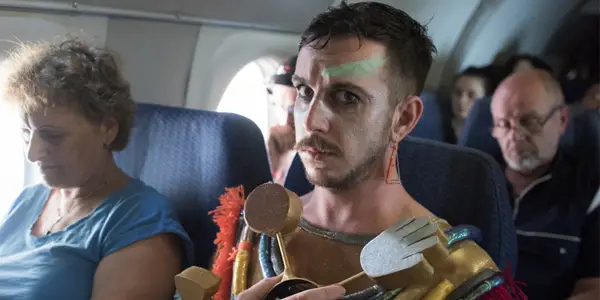Interview With Sophie Hyde, Director Of FUCKING ADELAIDE

Alex is a 28 year-old West Australian who has a…
Back in 2014, Australian director Sophie Hyde made a huge impact with her innovative debut feature 52 Tuesdays, a coming of age drama that won Hyde the directing award for world cinema at Sundance 2014, as well as the Crystal Bear at the Berlinale International Film Festival that same year. Shot over 52 consecutive Tuesdays, the film follows two parallel journeys – 16 year old Billie (Tilda Cobham-Hervey) transition into adulthood, as she must deal with her mother’s decision to gender transition, the other difficult change that the film details.
Hyde is now following up the success of that film with a new television series, the suburban-set comedic drama Fucking Adelaide. The series is a loving tribute to the city of Adelaide, the capital city of South Australia, centered on the reunion of a fractured family when family matriarch, Maude (Pamela Rabe) decides to sell the family home. This decision comes as a huge shock to her children Emma (Three Summers’ scene stealer Kate Box), Kitty (52 Tuesday’s Tilda Cobham-Hervey) and Eli (Brendan MacLean), especially when the real reason behind the house’s sudden sale comes to light.
In preparation for its upcoming premiere at the 2017 Adelaide Film Festival (where all the episodes will be shown back to back, as well as a sneak peek during the opening night gala) I had the great opportunity to speak with Sophie about the show’s inception, the importance of setting the show in Adelaide and her imaginative creative process.

Alex Lines for Film Inquiry: Whenever we see these major Australian projects, it’s always set in Melbourne or Sydney, so it’s quite refreshing to see an Aussie series focus on a different part of Australia that I find gets pretty underrepresented in Australian cinema. What would you say are the distinctive elements of Adelaide that you felt were important to integrate into the series?
Sophie Hyde: Yeah it’s interesting, I mean we called it Fucking Adelaide so we could shoot it here without any question, because we wanted to shoot here and setting it there and connecting it entirely to the name was a good way to do that. For us, Adelaide in this context, stands in for the idea of family, going home, being around the place you grew up in. I think there’s a lot of specificities of Adelaide, I think it’s an interesting city, often at times artistic, but also quite conservative, in many ways, it stands in for any suburb in any city, it has a strange thing where we love to self-hate it, but also stand up for it.
Adelaide-ians will fight with other people that it’s a great place to live, but we’re also quite self-deprecating of the place and I find that interesting. Wherever I travel, people always ask me “Are you gonna leave Adelaide? Are you gonna move now to Sydney?” and the answer is always no, I’m not, I’m gonna stay there. Other people don’t understand it’s a great place to live, but those who do, it’s a very lovely and comfortable place to live.
I’m in Perth, I always feel that I have to deal with the same type of questions. People always seem to favour the eastern states [Victoria, New South Wales and Queensland].
Sophie Hyde: Yeah that can be quite frustrating, you can really feel disconnected from things. But the plus side of that is you can get a lot of stuff done and it’s a really connected, lovely place to live. The good and the bad are the same, it’s great that you know everyone, but also, that can be really horrible. It’s so lovely that people know who you are and that you’re comfortable within your own skin and your identity, but at the same time, it’s very hard to shift that and change in a place like this.
Totally, because you always feel like you’re three degrees away from everyone.
Sophie Hyde: With Adelaide, it’s one degree (laughs). That’s what Fucking Adelaide is, you know when there’s coincidence in a TV series, and you’re like “oh please!”, well in Adelaide that’s really normal. You’re always like “Of course that’s gonna happen”.
In terms of filmmaking, what were the major differences you noted in creating a TV show compared to a feature film?
Sophie Hyde: Yeah it kinda gave me a sense of freedom, I felt like I needed to move things along quickly, so things happen quite fast, in a way that in a film I wouldn’t need to do, and lives right throughout the season. Whereas in a film, you can have a bit where you feel like the audience is in a cinema with you and go into other places, but in the TV show we felt like we needed to keep the same pace throughout the entire season, and that was fun.
The strange type of comedy in there is one of the ways we dealt with that, I really enjoyed breaking it up into episodes, I think originally we might make it in a way where it felt like a film, so we could keep going and didn’t need to break, but it was really fun to create these moments where it ends and resets into another character, because each of our episodes is told from a different character’s point of view, that was really enjoyable, being able to hone in on into one character and get right inside their head in each episode.
The first episode is Eli [Brendan MacLean], but also establishing the series, so it’s possibly the least like that. The next episode is Kitty’s [Tilda Cobham-Hervey] and that one is definitely inside her head, so that’s a stranger episode. The music in the episode is made from her voice, all the music is made from the voices in the cast, dependent on whose episode it is.
That’s funny, that was the next point I wanted to touch on. One of the great parts of the first episode is the barbershop quartet style music that echoes the dialogue in the scene. Was that something that came from the script or an idea that came later?
Sophie Hyde: No it wasn’t, it originally came from that second episode with Kitty, and that had something where I wanted to come out of the music and into the scene, once we started to play with that we decided to push it even further, so we were working with a composer Mario Späte who doesn’t come from Film/TV composition but from theatre and music producing, so we were able to play really hard with what he was doing, so all the music is into the world’s voices, there’s some stuff to support it, it came up during the edit, like the first episode has the “Shit-hole” riff, which was really funny to do and we were like, let’s just have a good time with that. It becomes really meaningful at points.
Did you have any specific artistic or cinematic influences in the creation of this series?
Sophie Hyde: For this, we were thinking a lot about the TV we really loved at the time, that we were really impressed by, in particular I’d say Transparent, shows like Girls and the Duplass Brothers show Togetherness which only got two seasons, they were big influences for us. We asked “What do we enjoy watching? It feels real but also entertaining, they like to tease their characters a little bit, but there’s also a great mixture of strangeness and sincerity at the same time. That’s what we looking for, we were looking at shows that were dramas, but also had comedy and were playful with their characters.

I noticed that the tone of this series is much more lighter/comedic than your previous feature film, 52 Tuesdays.
Sophie Hyde: 52 Tuesdays has the idea of being really dark, it is quite dark at times but it’s quite funny sometimes, but we never presented it as a comedy. The big thing we did is shifting the brain space into comedy, but I will say, the show does get quite dark, and then we bring it back to comedy all the time. We wanted it to be funny, and it was a lot of fun to make, but we do want to go to some dark places too.
It’s one of those thing where you want it to feel organic and not forced.
Sophie Hyde: Yeah that was an interesting balance for us and part of the learning curve, we weren’t going to make a broad comedy, that’s just not our bag, so how do you make something funny, it’s not laugh out loud funny, it’s just a bit odd.
It’s always unfortunate when you feel that the creators of a show/movie are selling out their characters for the sake of a joke, taking away their authenticity just for a laugh.
Sophie Hyde: Yeah and I really don’t like meanness, like it’s nice to tease your characters, but we love the characters too, and it’s kind of how we deal with Adelaide is the same as the characters, you can love and make fun of it, but you’re not being horrible, you’re not saying the people who like this are shit, I don’t love that in comedy.
It can come across as genuinely mean sometimes and you can risk losing your audience.
Sophie Hyde: Some people really enjoy that I think.
Did you find that after the success of that movie, that people were offering the same type of films?
Sophie Hyde: You would expect that wouldn’t you, but no. The things I was sent were not like that at all, I hardly got sent any queer or LGBT stuff, I got sent a lot of teen things and biopics, I’m not sure why, I mean I love teen stuff and I did read a lot of scripts and have been working towards a script in the UK for some time, which is constantly being in and out of finances, so it’s a bit delicate.
Mostly I wasn’t reading stuff that I was super excited by, and I don’t know if that was things I was being sent, but it’s really important to me to keep developing our own work here because as much as I’d love to make something like The Handmaiden’s Tale, which is incredible and something you’d want to make, mostly from here you need to be creating and building your own work.
Is this something you had written before 52 Tuesdays or something that came after that success?
Sophie Hyde: After definitely. We were developing some feature projects, and we wanted to make something quick and set here and with actors that we love, so we wrote the parts for Tilda Cobham-Hervey, Kate Box, Beau Travis-Williams and Audrey Mason-Hyde, and then cast the others around that. We were gonna do it without any ABC or other funding bodies, but then the ABC came onboard through this initiative, which was really good for us. We really want to work in an episodic medium, it’s really fun to work with characters over a long time, the idea that it could be multi-season with the same characters could be really enjoyable, so while we’re still developing these features, this felt like a really good place to go and it definitely something we developed after 52 Tuesdays, same time as well.

Relating to that, did you have the full crew in mind when writing these characters?
Sophie Hyde: We wrote Tilda’s role for her and Kate Box’s role, and we always had Beau in mind for Toby (the husband of Emma), Audrey (the child we only see for a split second in the first episode) is our daughter, so it’s all very closely connected to us. Then we cast Pamela Rabe pretty late in the piece but I was super excited because I love her, then we cast Brendan MacLean, who we didn’t know before, he’s a singer-songwriter, I think his work is really rad and his film clips are great and he’s got a really excellent, out-loud interesting persona, so it was great to take him into this.
Does the series have a public release date and if so, where can people find it?
Sophie Hyde: So we’ve got the Australian premiere at the Adelaide Film Festival, which the tickets are sold out for, so they’ve put on another screening, which is on Friday the 13th! Uh oh. Not really superstitious though. Later it’s going to be released on the ABC early next year, so it will go up on their main channel first, as well as their iView service, so we people can watch the entire series on that or they can watch it weekly on ABC1.
I saw that you were picked to adapt Emma Jane Unsworth’s Animals, are you in pre-production for that project at the moment?
Sophie Hyde: I am, Animals has been a very tenuous project, and a very difficult project to finance, so it’s struggling a little bit with the final pieces of finance, we thought we were about to go but we’re just in a little moment of uncertainty. So what we’re doing is developing the second season of Fucking Adelaide, and hopefully that’ll go as well.
Film Inquiry thanks Sophie Hyde for taking the time to speak with us.
Does content like this matter to you?
Become a Member and support film journalism. Unlock access to all of Film Inquiry`s great articles. Join a community of like-minded readers who are passionate about cinema - get access to our private members Network, give back to independent filmmakers, and more.













